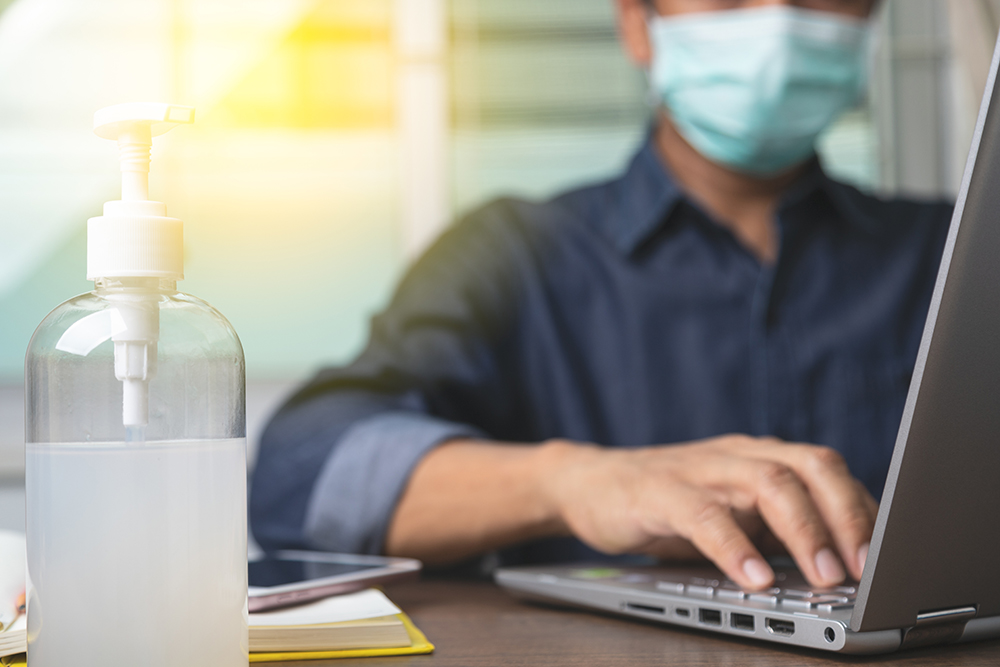

Columns/Blogs
Features
Health & Safety
Will the world of work ever be the same?
By Brian Kreissl
 More than 10,000 workers have contracted COVID-19 due to work-related exposures in Ontario, according to WSIB data. (jaruek/Adobe Stock)
More than 10,000 workers have contracted COVID-19 due to work-related exposures in Ontario, according to WSIB data. (jaruek/Adobe Stock) Many experts and pundits are suggesting the COVID-19 pandemic will usher in a “new normal” and accelerate certain trends in business and society that were already underway.
Some predict the world of work will never be the same again, and we will see, for example, more working from home, enhanced use of automation and even more business being conducted online.
Prior to the current crisis, people were increasingly cocooning themselves at home as social media and smartphone use began to replace actual human contact in a face-to-face environment.
It also seemed like people were becoming less focused on voice communications as text messaging and mobile apps (I am thinking about apps like Uber and SkipTheDishes) began to replace phone conversations.
It was also quite alarming how online channels were beginning to disrupt so many traditional brick and mortar industries and delivery channels.
Another change I noticed was how many people were becoming germophobes and increasingly wary of touching and coming into physical contact with people and things. (As an aside, I found the biggest germophobes were frequently the people who were sick most often.)
Accelerating changes
I am not trying to downplay the risks of COVID-19, be unsympathetic towards people with compromised immune systems or sound like a Luddite who completely rejects progress and technological innovation, but I believe the current crisis will accelerate each one of those changes.
COVID-19 is likely to have an impact on society and the way we do business for many years to come. This will also have a profound impact on the workplace.
Partially, this is about people becoming more fearful and introverted due to ongoing fears about safety, hygiene and cleanliness.
I also see many of the changes brought about by the coronavirus becoming more entrenched as people develop new habits and get used to alternate ways of working, purchasing goods and services and doing business. They could easily become accustomed to some new ways of doing things, thus making many of those new processes and expectations part of the new normal.
Many people will no doubt embrace the end of physical distancing measures.
I personally can’t wait to return to the gym, restaurants, bars, coffee shops, shopping malls, amusement parks, concerts, sporting events, provincial parks and travel (both for leisure and business).
I’m also looking forward to returning to the office. I enjoy working from home on an occasional basis, but I don’t think I would want to do it every day. While I love spending time with my daughter, I am also looking forward to schools reopening.
While lots of people, like me, can’t wait for normal life to resume, many more are extremely wary of being exposed to the virus. I also think a lot of people will have gotten a taste of things like working from home and ordering online and won’t be in a rush to return to the office or shop at traditional bricks-and-mortar retail stores.
Fears and revised expectations
People will be fearful about catching and transmitting the coronavirus for many months to come. Some experts predict the virus could be with us for many years — or may even be something we will need to live with essentially forever.
A vaccine will help, but that could take years to develop (I have heard estimates of between one and five years). I even heard one expert say there is no guarantee a vaccine would even be all that effective.
With the anti-vaxxer movement gaining steam, I also worry enough people might refuse to take the vaccine that the development of herd immunity would be compromised.
I believe people will be more worried about germs and communicable diseases moving forward, even if we manage to completely eradicate COVID-19. This will result in companies needing to rethink close spaces and high-touch service delivery models.
Employees may resist working closely together in cubicles, and a fairly significant number of people will likely insist on wearing masks even after the crisis is over.
Organizations may also need to rethink their telecommuting policies. Some may even transition to a remote workforce for all or most employees.
I believe employers will also increasingly be looking for employees with digital skills to staff positions as even more business is shifted online. Another example of a likely change is restaurants may need to adapt to more takeout and delivery business and away from sit-down meals.
These are just some of the challenges different types of businesses will be faced with as they adapt to a post-pandemic world.
Brian Kreissl is a product development manager with Thomson Reuters in Toronto. He looks after HR, payroll, OH&S, records retention and Triform. He can be reached at brian.kreissl@thomsonreuters.com or (416) 609-5886. For more information, visit https://store.thomsonreuters.ca/en-ca/home.
Print this page